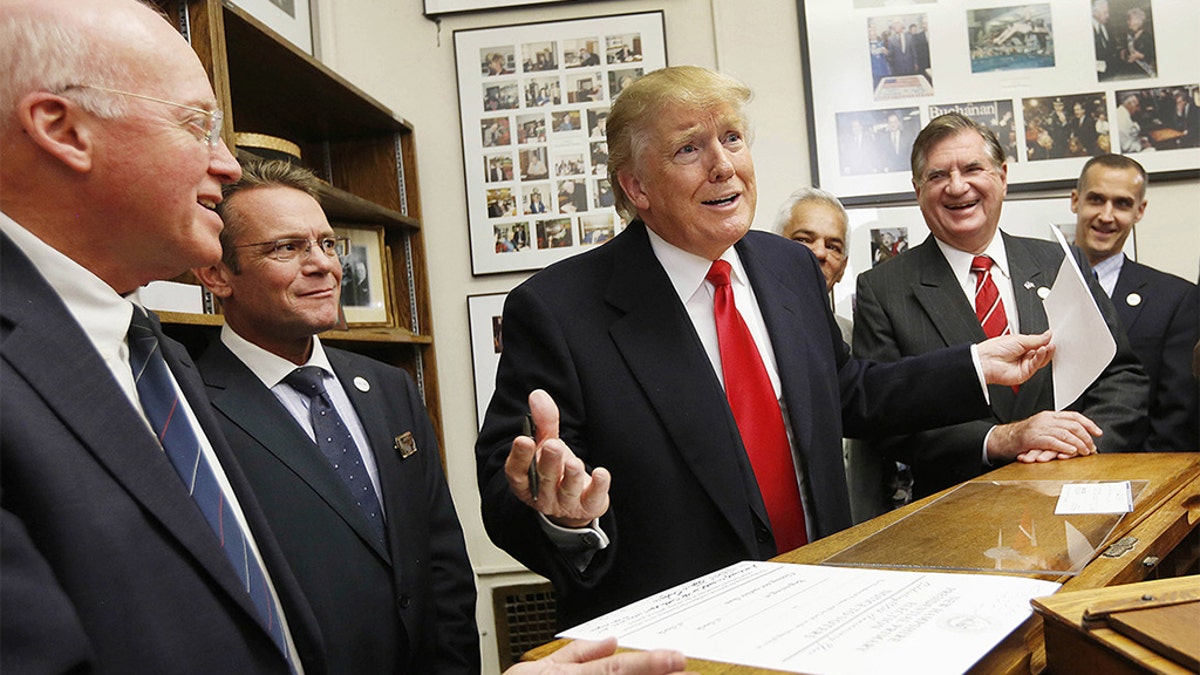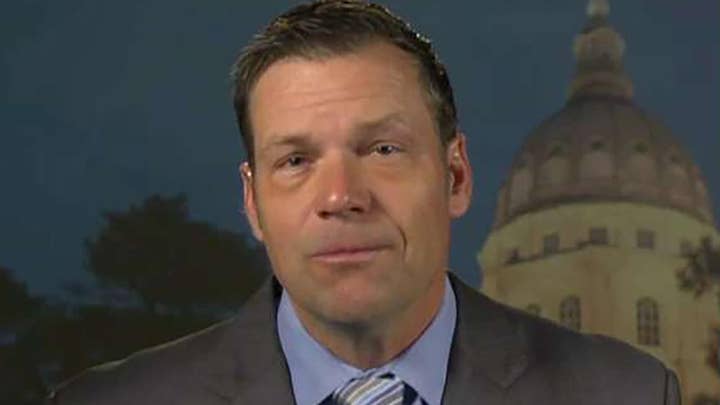
In this Nov. 4, 2015, file photo, New Hampshire Secretary of State Bill Gardner, left, watches as then-Republican presidential candidate Donald Trump fills out his filing papers to be on the primary ballot at the Secretary of State's office in Concord, N.H. (AP Photo/Jim Cole, File)
CONCORD, N.H. – For more than 40 years, New Hampshire Secretary of State Bill Gardner has been a crucial player in presidential politics.
Gardner, known nationally as one of the chief guardians of his state’s treasured status holding the nation’s first presidential primary, is also the longest-serving secretary of state in the country.
But thanks in part to his participation last year in President Trump’s now-disbanded voter fraud commission, Gardner is facing his most difficult re-election in decades – as he runs for a 22nd two-year term as New Hampshire’s top election official.
Republican state Rep. Al Baldasaro, who was a leading supporter and surrogate for Trump’s 2016 presidential campaign in the state, claimed widespread opposition to Gardner by Democratic state lawmakers “is payback” for the secretary of state’s service on the commission.
“They hate the idea that Trump is the president,” he said.
Gardner’s moment of truth comes Dec. 5.
That’s when re-elected and newly elected state senators and representatives are sworn in, and then immediately vote for secretary of state.

New Hampshire Secretary of State Bill Gardner faces a tough re-election fight. (Paul Steinhauser)
Most GOP lawmakers appear to be backing Gardner over challenger Colin Van Ostern.
“Republicans love Bill Gardner,” House GOP leader Dick Hinch proclaimed.
But the problem for Gardner is there are now a lot more Democrats in the legislature, after the party regained control of both chambers in the midterm elections.
Gardner was a Democratic state representative when he was first elected secretary of state in 1976. But his once-impeccable bipartisan reputation has taken a hit the past two years with Democrats. They are furious over his participation on the voter fraud commission and his support for two GOP-sponsored bills passed into law that tighten the state’s voter eligibility requirements, which many Democrats characterize as voter suppression measures.
Pushing back against Democratic criticism of his support for the two new voter laws, Gardner points to this month’s election, highlighting that “we had the highest turnout of any midterm.”
Regarding his service on the commission, Gardner acknowledges that some Democrats “may never forgive me.”
But he argued that “it was better that New Hampshire be represented than not” and he “was bringing the New Hampshire values and my values to that commission. And it’s better to be at the table than on the menu.”
New Hampshire House of Representatives Democratic Leader Steve Shurtleff opposes Gardner’s re-election bid.

Colin Van Ostern is challenging Bill Gardner for his coveted secretary of state post. (Paul Steinhauser)
“It disappointed me that Bill Gardner took the stance that he did and served on the commission knowing what their intent was and what the outcome would be. I thought it showed poor judgment. Especially when New Hampshire had been vilified by the president in his saying that busloads of people were coming up here to vote and the secretary of state knew that was not true,” argued Shurtleff, who’s expected to be elected state House speaker next week.
In September of last year, Gardner faced loud calls from leading Granite State Democrats – from top Statehouse leaders to the entire all-Democratic congressional delegation – to quit the commission after the panel’s co-chair, Republican Kris Kobach, made unsubstantiated claims about the validity of the 2016 U.S. Senate election results in New Hampshire.
Days later, at a meeting of the commission that Gardner hosted in New Hampshire, he vigorously pushed back against Kobach’s claims that voter fraud may have contributed to Democratic challenger Gov. Maggie Hassan’s razor-thin victory over GOP incumbent Sen. Kelly Ayotte in the 2016 election.
But the damage done to Gardner’s reputation among Democrats apparently was lasting.
In a non-binding test vote earlier this month, the now-majority Democratic House caucus voted overwhelming to support Gardner’s challenger. The 39-year old Van Ostern, a former executive councilor and 2016 Democratic gubernatorial nominee, wasn’t even born when the now-70-year-old Gardner was first elected as secretary of state.
Since announcing his candidacy in March, Van Ostern’s been actively campaigning for the job. His political action committee raised over $200,000 in donations and spent the money to promote his proposals to reform and modernize the office, including holding over 200 forums around the state with legislative candidates.
“I think we need a more modern and accountable secretary of state’s office and we need to do a better job of protecting the rights of every voter, and every local official who helps make our elections work well,” Van Ostern said.
While he added that “it’s really important that this be a non-partisan office,” most Republicans view him as overly political and pro-Democrat.
Hinch called Van Ostern, a one-time Democratic strategist, “a proven partisan political operative.”
Republicans also argue that replacing Gardner with Van Ostern would jeopardize New Hampshire’s status as the first-in-the-nation primary state.
“This will be the only time that you ever hear me endorsing a Democrat,” said Steve Stepanek, a leading contender for New Hampshire GOP chair. “Bill Gardner is the guardian of the New Hampshire first-in-the-nation primary.”
Stepanek urged GOP lawmakers last week “to go out and support [Gardner] and get the Democrats to support him because I don’t think this is a Democratic issue or a Republican issue. This is a New Hampshire issue.”
Some Democrats who are supporting Gardner make the same argument.
Longtime Sen. Lou D’Allesandro spotlighted that Gardner has “protected the first-in-the-nation primary. He’s well-respected by his peers around the country.”
And former Democratic National Committee member Terry Shumaker teamed up with current Republican National Committee member Steve Duprey in a recent opinion piece to pitch another term for Gardner.
“We believe the key to his success has been that he was not a partisan Democrat or Republican with political ambitions, but a dedicated public servant who is fully trusted by both parties to do the right thing without concern for his own political future or that of any particular presidential candidate,” they wrote.
On Tuesday, Gardner highlighted his defense of the state’s presidential election role, telling lawmakers, “You can never depend on someone else to protect this primary.”
Most recently in the run-up to the 2012 primaries, Gardner threatened to move up New Hampshire’s date to December 2011, to prevent an effort by Nevada to move up their own nominating contest.
But Van Ostern dismissed the argument that only Gardner could keep the state’s primary status. He pointed to New Hampshire law that mandates the date of the contest be earlier than other state’s primaries and vowed to “fiercely and without compromise” uphold the law.




